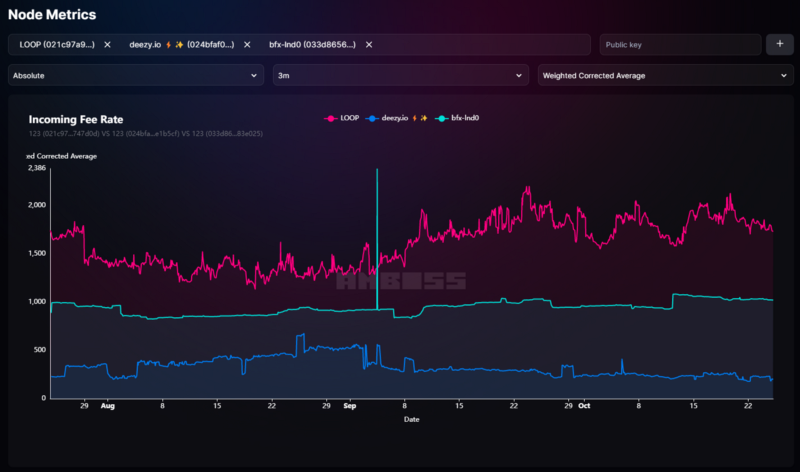Is that this new Amboss characteristic as harmful because it appears to be like? The analytics firm unveiled “Reported Channel Balances” and the bitcoin world instantly reacted with extreme criticism. Had been they overreacting or did they’ve a degree? Is bitcoin’s Lightning Community in danger? Let’s examine precisely what occurred and discover out. All of it begins with the notion {that a} node’s capability shouldn’t be the identical as a node’s liquidity.
We have additionally given node operators the power to share and analyze their node standing, together with channel balances. It will enable us to ship higher insights, notifications, and valuations for bought channels. pic.twitter.com/YgJmxFokS8
— AMBOSS 🔳 👾 (@ambosstech) October 26, 2022
In the medium post announcing the “Reported Channel Balances” characteristic, Amboss expands on the thought:
“One main piece of knowledge that has been lacking because the starting of the lightning community is the distinction between lightning’s capability and its liquidity. To seek out the distinction, we want a chunk of knowledge that (fortunately) is non-public by default: channel balances.”
Since that’s nonetheless a key piece of knowledge, many actors discover out channel balances through the use of the probing approach, “which is an tried fee designed to fail, reveals non-public details about channel balances with out consent. It’s, in a approach, an assault on the privateness of nodes.” So, Amboss is aware of that the Lightning Community’s privateness is at stake. The sender’s funds are additionally a stake, since they “could get locked, quickly.” And it’s even worst for the goal.
Amboss’ Thought: Reported Channel Balances
So, to section out probing, Amboss enabled a approach for nodes to voluntarily report their balances. “we’ve created a single endpoint that customers can ship this knowledge to and will probably be displayed on the node’s Amboss web page.” There’s the potential for sharing the information simply with Amboss, however nodes can go public with their info if they need. “The settings span from Personal (shared solely to Amboss), Vary (stability proven publicly as 25%, 50%, or 75%), or Public (the precise proportion is proven to Amboss guests).”
Normally, the thought behind the characteristic appears just a little naive, and nowhere is that extra evident than in the way in which they’ll deal with mendacity nodes. “In reality, anybody can write a script to lie about their balances. As an alternative of making an attempt to rout out the liars from our knowledge set, we’ll strive a special strategy: ship companies primarily based solely on the data we’re advised.” The Amboss folks took “kill them with kindness” to a brand new degree.
“We’re constructing instruments to assist node operators whether or not it’s by offering notifications and alerts or by offering insights that assist customers make good choices with their nodes. One of the simplest ways that we can assist is that if customers are sharing their balances actually.”
So, the inducement to be sincere is the dear data that Amboss will provide you with? Sounds frail.

BTC value chart for 10/28/2022 on Kraken | Supply: BTC/USD on TradingView.com
The Case Towards Reporting Channel Balances
Lightning developer Openoms, whose twitter bio says “Constructing nodes for Safety, Privateness and Freedom,” lead the cost in opposition to Amboss’ new self-policing characteristic. “If this knowledge sharing and aggregation by Amboss will get widespread and correct we’ll have an enormous downside with Lightning privateness.” He additionally provided options, attainable guidelines, and a transparent plan of action. “Good it’s open-source, let’s make it not attainable to share greater than 2 bits of information.”
Some mitigations for now:
cannot actually inform if somebody is sharing privately, nonetheless:
* do not peer with sharing nodes
* keep away from paying by sharing nodes
* look out for CLN friends who cannot run Thunderhub
* feed it random knowledge if something
* use aggressive MPP and longer routes— openoms (@openoms) October 27, 2022
Openoms additionally breaks the already frail logic behind the characteristic and poses that as an alternative of creating “knowledge sharing the norm as a result of probing is already attainable” we should always “make probing harder, costly and inconclusive.” As for the actionable objects, Openoms provides “some mitigations for now:”
- “Don’t peer with sharing nodes”
- “Keep away from paying by sharing nodes”
- “Look out for CLN friends who can’t run Thunderhub”
- “Feed it random knowledge if something”
- “Use aggressive MPP and longer routes”
How did Amboss react to the criticism?
Amboss’ Fast Response
Say what you’ll in regards to the analytics firm, however their response was cool, calm, and picked up. “We sincerely admire the entire suggestions (even when it’s unfavourable) with respect to our channel stability sharing characteristic,” Amboss tweeted. Then, they gave credit score the place credit score was due. “Particular shout out to Tony Giorgio & Openoms who’ve offered invaluable perception on serving our customers whereas preserving network-level transaction privateness.” Amboss additionally clarified that the characteristic is opt-in and comes disabled by default.
One vital truth to get proper amidst the controversy: The @thunderhubio design is OPT-IN solely and personal by default.
Thunderhub is a user-friendly MIT-Licensed node supervisor that respects the consumer’s decisions.— AMBOSS 🔳 👾 (@ambosstech) October 27, 2022
Earlier than we go, we’ve got to search out out what did Tony Giorgio say that was so insightful. He led the discussion within the phenomenal Stacker Information, and began the hearth by writing:
“We achieve this a lot to attempt to shield the privateness of the lightning community however all the time going to be continually combating the tendencies for society to provide away info for comfort. I can’t start to inform you how aggregating this info to a single occasion is an assault on Lightning and the privateness of all people as an entire.”
Candy, outdated comfort. How a lot hassle have you ever led humanity into?
Featured Picture: The platform's dashboard, from this tweet | Charts by TradingView


